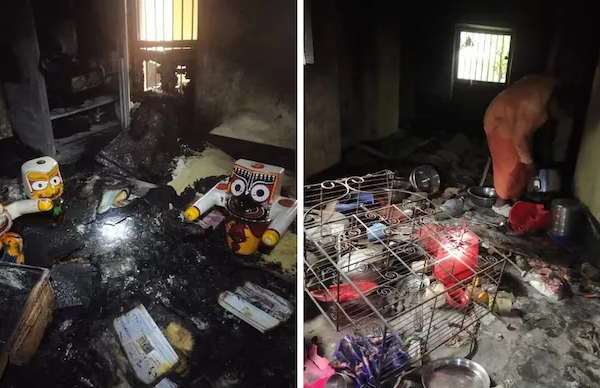Philippines joins US-led allies in multilateral maneuvers in South China Sea
The Philippines joined the United States, Australia and Canada in a two-day “maritime cooperative activity” from Wednesday to press for freedom of navigation and overflight in the South China Sea amid maritime tensions with China. The navies and air force units of the four nations will operate alongside each other to enhance “cooperation and interoperability” in the disputed waterway, a joint statement said. “We stand together to address common maritime challenges and underscore our shared dedication to upholding international law and the rules-based order,” it said. “The activity will be conducted in a manner that is consistent with international law and with due regard to the safety of navigation and the rights and interests of other States.” The statement was signed by Gen. Romeo Brawner, the military chief of the Philippines, U.S. Indo-Pacific Command chief Adm. Samuel Paparo, Australian Defence Force chief Admiral David Johnston and Gen. M. A. Jennie Cargian, the chief of Canada’s Defence Staff. “Australia, Canada, the Philippines, and the United States uphold the right to freedom of navigation and overflight, other lawful uses of the sea and international airspace, as well as respect for maritime rights under international law, as reflected in the U.N. Convention on the Law of the Sea (UNCLOS),” they said. The aim of the multilateral sail was to demonstrate a “collective commitment” to boosting international cooperation. The statement did not specifically say where the drills would be held, only that the maneuvers would take place “within the Philippines’ exclusive economic zone” in the South China Sea. The Philippines last week carried out similar joint sails with Japan and with the U.S. separately in Philippine areas of the South China Sea. Coast guards from the Philippines and Vietnam meanwhile are scheduled to hold their own joint drills on Friday. In related news, China on Wednesday conducted air and sea patrols near Scarborough Shoal, a flashpoint in territorial tensions between Beijing and Manila, according to a report by Agence France-Presse. Analysts praise multinational maneuvers Chester Cabalza, president of International Development and Security Cooperation, a Philippine think-tank, hailed the defense deals with various allies. He noted that prior to this, Manila had also signed a groundbreaking Reciprocal Access Agreement (RAA) with Japan, another country with a territorial dispute with China. That deal would allow the exchange of troops for joint training with each other. He said the multilateral sails this week show the “global recognition” of Manila’s international arbitration award in 2016 in its territorial dispute with China over Scarborough Shoal. “It shows the legitimacy of its sovereignty rights in the disputed maritime domains of the South China Sea,” Cabalza told BenarNews. “It reaffirms the bone of contention that China alone is not the sole owner of these important sea lanes of communications and trade,” he said. He said the joint sails should work to “solidify” the belief that countries should follow the rules-based order in the disputed sea region, a key shipping route where experts say more than 60% of global maritime trade passes. Geopolitical analyst, Don McClain Gill at the De La Salle University in Manila, said the joint sails affirm the 2016 ruling but he emphasized that such activities need to be done on a regular basis. “Patrols and exercises are very important in ensuring the freeness and openness of the maritime domain, but it must be supplemented by other activities as well, such as capacity building and more robust and permanent deterrence posture in our area in the West Philippine Sea,” Gill told BenarNews, referring to South China Sea waters within the Philippines’ exclusive economic zone. “This is a very good indication that like-minded countries, three of which are part of the exercise, recognize that the Philippines is legitimately entitled to its sovereign rights and sovereignty based on UNCLOS and the 2016 arbitral ruling,” Gill said, alluding to the U.N. Convention on the Law of the Sea. “This is significant in that regard and must be continued,” he said. “As we can see, the Philippines has become a fulcrum for maritime cooperation.” Countries such as Canada, which are far removed from the conflict, are also concerned because they are worried it may affect global trade and affect the stability in a “very critical maritime space,” he said. While global partnerships like the joint sail are important, he said this had not deterred Beijing from continuing with its activities in the South China Sea. But this should not be taken negatively by the Philippines, but rather as an “opportunity to explore what else could be done.” Last week, U.S. Defense Secretary Lloyd Austin and Secretary of State Antony Blinken met their Filipino counterparts in Manila and announced a U.S. $500 million infusion to help Manila defend its shores from threats posed by China. The funds would go towards strengthening Manila’s defenses in the South China Sea, and the monies came shortly after tensions and confrontations surrounding Ayungin Shoal or Second Thomas Shoal in the South China Sea. Manila maintains a rusting World War II-era ship in Ayungin, and a violent confrontation there in June saw a Filipino serviceman lose a thumb. Both sides have subsequently worked towards de-escalating the tensions, but it remains unclear how China would react to the joint sails this week. Jeoffrey Maitem contributed to this report from Manila. BenarNews is an RFA-affiliated online news organization.


